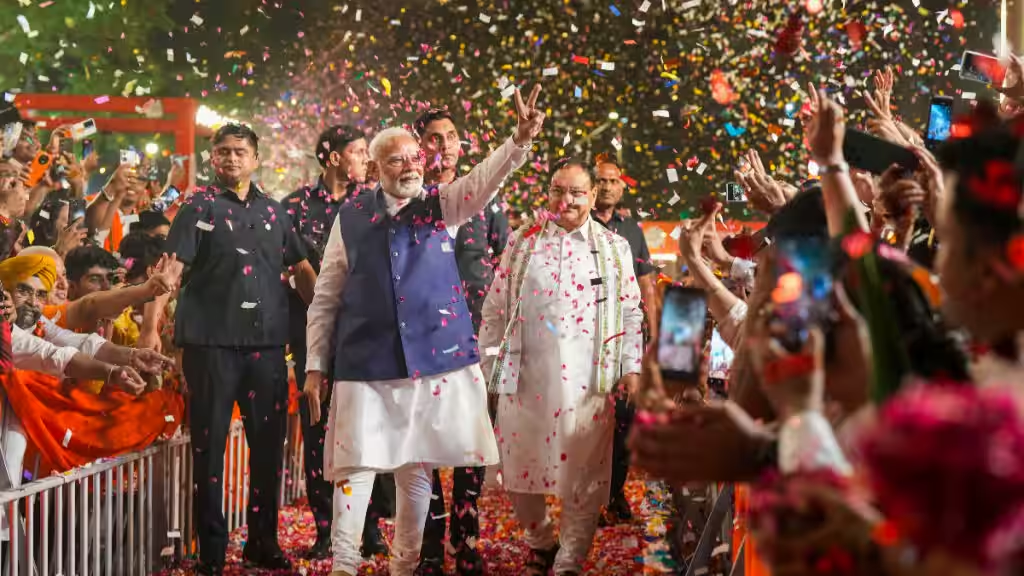In a dramatic turn of events, the political landscape of India has shifted significantly. Prime Minister Narendra Modi’s coalition has managed to secure the 272-seat threshold required to form a government, but the road ahead seems rocky. Despite the victory, Modi’s Bharatiya Janata Party (BJP) has lost its outright parliamentary majority, securing only 240 out of 543 seats. This result falls far short of the ambitious 400-seat target Modi set for himself during the election campaign.
The Narrow Path to Victory
The outcome has surprised many, given Modi’s previous stronghold on Indian politics. The BJP’s performance indicates a decline from its previous dominance, suggesting a shift in the electorate’s mood. The National Democratic Alliance (NDA), led by Modi, clinched the necessary seats but not without showing signs of vulnerability. Modi’s speech at the BJP Headquarters in Delhi reflected a mix of triumph and acknowledgment of the challenges ahead. He reiterated his commitment to eradicating corruption “from the very root” and vowed to make his third term impactful.
Opposition Gains Ground
While the BJP has been a formidable force, the opposition coalition, INDIA, has performed remarkably well. Securing 193 seats, the coalition has surpassed expectations, particularly in the southern regions of India. The Congress Party, a significant member of this coalition, has played a pivotal role in this resurgence. Rahul Gandhi, widely considered Modi’s primary opponent, interpreted the results as a rejection of Modi’s agenda to alter the constitution. Gandhi’s perspective hints at a broader discontent with the ruling party’s policies and governance style.
The Implications for Modi’s Third Term
Modi’s promise to tackle corruption is now under greater scrutiny. With a reduced majority, the BJP will need to navigate a more complex political environment. The necessity of forming alliances and negotiating with smaller parties could influence the government’s ability to implement its agenda. Modi’s leadership will be tested as he seeks to deliver on his promises amid a more fragmented parliament.
The Surge of Regional Parties
The election results have also underscored the growing influence of regional parties. In states like Tamil Nadu, Kerala, and Andhra Pradesh, regional parties have outperformed national ones, reflecting localized dissatisfaction with the BJP. This trend suggests a more diversified political landscape where regional issues and leaders hold significant sway. The success of these parties could lead to a more balanced and representative parliament, addressing regional disparities more effectively.
Rahul Gandhi’s Resurgence
Rahul Gandhi’s role in the election has been noteworthy. His campaign focused on criticizing Modi’s economic policies, handling of the COVID-19 pandemic, and proposed constitutional changes. Gandhi’s narrative resonated with many voters, particularly the youth and marginalized communities. His assertion that the results indicate a rejection of Modi’s plans suggests a renewed confidence in the Congress Party’s ability to challenge the BJP.
The Road Ahead for the NDA
The NDA’s ability to maintain unity and coherence will be crucial. As smaller parties within the alliance gain more leverage, managing internal dynamics will become a priority. The BJP’s reduced majority means that coalition partners could push for more significant concessions and influence policy decisions. This internal balancing act will be a critical aspect of the NDA’s governance strategy.
Economic and Social Policies in Focus
With the election over, attention now shifts to the NDA’s policy agenda. Economic recovery, job creation, and social welfare programs are likely to be high on the list. Modi’s administration will need to address the economic challenges exacerbated by the pandemic, including unemployment and inflation. Social policies aimed at improving healthcare, education, and infrastructure will also be essential to garner public support.
International Relations and Foreign Policy
Modi’s third term will also involve navigating complex international relations. India’s stance on global issues such as trade, climate change, and regional security will be closely watched. Strengthening ties with strategic partners like the United States, Japan, and European countries, while managing relations with neighboring countries like China and Pakistan, will be pivotal.
A New Era for Indian Democracy
The election results mark a new chapter in Indian democracy. The reduced majority for the BJP, the resurgence of the opposition, and the rise of regional parties collectively indicate a more pluralistic political environment. This shift could lead to a more balanced and inclusive governance model, addressing diverse regional and national issues more effectively.
Conclusion: A Fragmented Mandate and a Challenging Path Forward
India’s latest election has delivered a fragmented mandate, presenting both challenges and opportunities for the ruling coalition. Prime Minister Narendra Modi’s leadership will be crucial in navigating this complex landscape, balancing coalition dynamics, and delivering on key promises. The strengthened opposition and influential regional parties suggest a more vibrant and competitive political environment. As India moves forward, the focus will be on how effectively the government can address the pressing economic, social, and political issues facing the nation.












